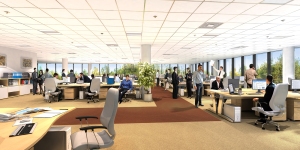Does hot-desking in Starbucks or Costa improve creativity?

“Coffitivity.com streams an endless loop of coffee shop background noise to your headphones, to help you stay focused while you work.” [1] I’ve just gone to Coffitivity.com and the website is now streaming the quiet chatter of a coffee shop out of my computer loudspeakers while I type this blog. But will this cafe soundscape help me to be “more creative” than if I wrote in a quieter place as Coffitivity.com claims?
How do you find the noise in a coffee shop, does it help or hinder your work? Please comment below.
The research quoted by the app’s website comes from a paper by Ravi Mehta and colleagues [2]. The paper tells how the researchers played hubbub noise at 50, 70 and 85 dB and tested how that affected subjects completing tasks. The first task asked people to identify the fourth word in a series. For example subjects might see “Shelf,” “Read,” and then “End” on a computer screen. The right answer in this case would have been “Book”.
The test subjects got more words right with the middle noise level of 70 dB compared to the quieter condition of 50 dB. A further 5 experiments , brought more evidence to support Mehta’s hypothesis that the noise at 70 dB makes the brain work harder, leading to more abstract thought and creativity compared to listening in quieter conditions.
I found this result surprising because 70 dB is a typical level for a noisy restaurant, this isn’t peaceful cafe chatter. This is loud enough that you would have to raise your voice to hold a conversation. Last year an experiment I was involved in testing secondary school students found that in 70 dBA classroom babble, 14-16 year-olds performed no better than 11-13 year-olds who had quieter conditions of 50 dBA babble. [3]
I now realise I’m streaming the cafe soundtrack from coffitivity.com much too quietly. Time to turn it up and see if that helps my creativity.
Open plan office noise

Many people have looked at how office noise affects performance. James Szalma and Peter Hancock analysed and summerised the results from 242 studies. [4] What does that say about the effect of loudness, does it support Mehta’s findings? Sadly, results are inconclusive. Personally I find blasting the cafe noise at 70 dB from coffitivity.com is too much, I’m finding it difficult to write without being distracted, I’m going to have to turn it off.
What the literature does agree on, is that when thinking about the hubbub in the coffee shop or cafe, it is probably the type of the sound that is most important. Distinguishable speech is much more disruptive to people trying to work at their laptops or tablets, than the more benign rumble of traffic or the incomprehensible babble from many people chatting over their lattes. You probably know this from personal experience, if someone on a neighbouting table takes a mobile phone call in a coffee shop, it is very hard to ignore the conversation. The reason for this is distinguishable unwanted speech is rich in information that our brain finds difficult to ignore. In contrast, the gentle rumble of traffic isn’t very interesting and our brain gradually tunes it out.
But if I was going to moan about one cafe sound, it would be the noise of the barista working the coffee machine. This sudden loud noise often distracts me. This happens because hearing is first and foremost an early warning system listening out for danger. Designed to warn us about tigers approaching from behind, this early warning system is trigger by the coffee machine screeching and howling.
One of our undergraduates in acoustic engineering at Salford Univeristy is going to be studying cafe sound for their final year project starting in October. So maybe I’ll have more to report next year.
What sounds do you like to work to? Please comment below.
Notes
[1] http://www.guardian.co.uk/technology/2013/jun/16/future-of-behaviour-concepts-for-21st-century
[2] Ravi Mehta, Rui (Juliet) Zhu, and Amar Cheema, Is Noise Always Bad? Exploring the Effects of Ambient Noise on Creative Cognition, Journal of Consumer Research, DOI: 10.1086/665048
[3] http://www.independent.co.uk/news/education/education-news/children-suffer-in-classrooms-with-poor-acoustics-2287447.html
[4] Szalma, James L. and Hancock, Peter A, “Noise Effects on Human Performance: A Meta-Analytic Synthesis, ” Psychological Bulletin 137(4), July 2011, p 682–707.
Photos. Barista by Kuba Bożanowski from Warsaw, Poland, open plan office by Foundation7.
0 responses to “Does the sound of a coffee shop help you work?”
I tend to agree that listening to Coffitivity at the level they recommend is too loud for my taste. However, I also think this may be due to the conditioning of years of being forced to work in near silence (excluding the annoying sound of the air conditioner, the copier, the night bell that no-one answers, the microwave, the random air tool being tested, etc.).
The most annoying thing I have found about Coffitivity is the sound itself. It hasn’t changed since I started listening to it and I am now finding myself “predicting” the next sound. There is also a “wooing” in the background that really grates me. My hope is that the sound will change at some point.
Until then I am going to continue playing with it. Maybe there is something to this. It does seem to really good at blocking out the annoying sounds around me!
[…] productive and creative in cafes because at cafes the noise is around 70 decibels and that is the perfect range to inspire creative thoughts in people. You can replicate this effect by using a service called […]